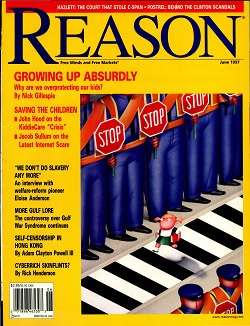From the Archives: The Best of Reason on Youths
Not just for millennials

Millennials! Reason-Rupe recently ran a much-talked-about poll on millennials' views on politics and government, and the October issue of Reason magazine focuses on the generation defined loosely as those born between the mid-80s and late-90s. But Reason has a long history of focusing on young people and youth issues. The magazine was launched by student Lanny Friedlander in 1968 at Boston University and has always had a focus on student issues.
Long before the student loan bubble became almost impossible to ignore, Reason's been exploring better ideas. Reason's been at the forefront in spotlighting the generational warfare entitlement programs represent.
In a 1987 article, James Harris wrote about a Vietnam draft dodger who served a six-month sentence in the late-80s, ending a nearly decade-long struggle against authorities.
Reason has been there to debunk all kinds of drug scares used to push the Drug War mentality, from butt chugging and vodka-soaked tampons to Ecstasy and techno music, and has been refuting arguments those who would use dangers to youth to control the Internet since back when it was called the World Wide Web. Just in June, Jesse Walker provided a short history of gaming panics in the video game themed issue of Reason. Thomas Hazlett explored the use of children to push stricter rules for television in a January 1991 article "Child's Play". Reason also pushes back whenever the appeal for mandatory "national service" to "fix" youth comes to the forefront of American politics. The June 1997 issue of Reason ran a cover story on "Child-proofing the World," and Hit & Run has explored how parents face increasingly interventionist

governments at all levels of power. In April, Reason magazine spotlighted the "The War on Fun," while in the October 2006 issue an article on "The Real Mommy Wars" explored how both the left and right try to use government to interfere with parenting. In the April 1991 issue, John Hood warned about the "Curfew Craze." In 1987, during a surge in religious anti-rock sentiment, Leo Miletich explored hundreds of years of religious fear of the power of music.
In the August/September 2003 issue, Virginia Postrel explained why Buffy: The Vampire Slayer, the insta-cult Joss Whedon television show about a vampire slayer in southern California, "kicked ass." Reason has also granted critics of the digital generation the floor: In October 2008, Nick Gillespie talked to the author of The Dumbest Generation, Emory University Professor Mark Bauerlein.
Reason hasn't just focused on youth in America. In the December 2010 James Dorsey wrote about the role of American culture in the Muslim world in an article titled "Rap and Metal on Planet Islam." It predates the Arab Spring and its critical youth component.


Show Comments (24)